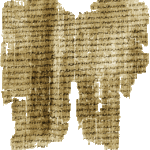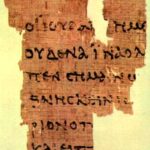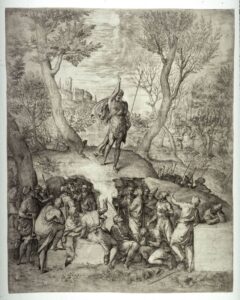John – the Eyewitness Gospel

Gospel of John is widely believed to be an eyewitness account written independently of the Synoptic Gospels. Identifying himself as a Disciple, the list of possibilities for authorship is thus limited to the eleven Disciples.[1]
Possibilities can then be narrowed to the inner circle of Jesus – Peter, James and John. They were the only three Disciples chosen by Jesus to be with him during the Transfiguration and his final prayer on the Mount of Olives.[2]
James was executed decades before John’s Gospel was written excluding him as a possibility.[3] Peter can be ruled out because he is identified as the one who motioned to the Disciple author who was leaning on the chest of Jesus to ask for more details about the betrayer among them. By deduction, John is the Disciple author of the Gospel.[4]

Oldest of the fragments of the Gospel of John are dated to as early as 125 AD, possibly from the original manuscript text.[5] John’s account is believed to have been written when John was in his 90s, a few short years before he died in approximately 100 AD.[6]
Some assert that the Disciple John, aka Apostle John, was not the actual author, rather someone else wrote it for him.[7] If indeed that is the case, advanced age may have required someone else to write the words on his behalf. Nonetheless, written or dictated, the account reflects intimate knowledge of someone who was there.
Like the other three Gospels, the author does not specifically identify himself. One reason for no authorship can be attributed to the Jewish literary protocol of that era not to pen a name to literary works.[8]
To draw a conclusion on authenticity, it must be drawn based on the evidence within the Gospel. A credible eyewitness statement is expected to begin when the witness becomes engaged in the event; typically written chronologically as memory recall dictates; makes references to specific dates and times, locations and names; and may include quotes.[9]
One of the most obvious examples that the author was there is the description of the Resurrection morning events. After a pretext setting, his description begins at the point when Mary Magdalene and other women burst into the room telling John and Peter what they had seen and heard at the empty tomb — the account begins when the author became personally involved.[10]
Ending the Gospel is a another personal situation after breakfast on the Sea of Tiberias shore with the resurrected Jesus. A conversation is described that the author overheard between Jesus and Peter.[11]
Compared to the parallel Jewish writing style of Matthew, Mark and Luke, naturally there are going to be chronological timeline variations.[12] Chronologically written, the Gospel marks the sequence of events using the annual Feasts in Jerusalem.[13]
Time frames covering three years are clearly defined beginning with the first year of ministry by Jesus when John writes “the Passover of the Jews was near.”[14] Next, marking the the second year midpoint, “Now the Passover, the festival of the Jews, was near.”[15]
Lastly, the Gospel account moves into the third and final year with “Now it was the Preparation Day of the Passover.”[16] Times of day, in some instances the very hour, are pinpointed in the Gospel.[17]
Locations details are so frequent, it is easy to map the journey of Jesus throughout his ministry. Obscure locations are named, “Aenon near Salim” and a “Samaritan town called Sychar” as well as places near Jerusalem, “the Kidron Valley” and the “Mount of Olives.”[18]
Precise locations within Jerusalem are identified, the “Sheep Gate a pool called Bethzatha in Aramaic, which has five covered walkways;“ “‘The Stone Pavement’ (Gabbatha in Aramaic)” and “the Roman governor’s residence” of Pilate.[19]
“Cana in Galilee” is named three times, first where Jesus turned water to wine and is later identified as the hometown of Disciple Nathanael.[20] Bethany is cited as the hometown of the siblings Mary, Martha and Lazarus as well as a place where John the Baptist performed baptisms.[21]
Personal names are many offering yet another validation to the identify of the Gospel’s author. The author referred to “John the Baptist” only as “John” – there was no need to distinguish between another “John.”[22]
Some Disciples were identified as Andrew, Simon Peter, Philip, Nathanael, Thomas and ”Judas (not Judas Iscariot).”[23] Named also are two Pharisee members of the ruling Jewish council Nicodemus and Joseph of Arimathea; adversaries Caiaphas, Annas, and Pilate; and other followers of Jesus, Mary the wife of Clopas, Mary Magdalene and the siblings Mary, Martha and Lazarus.[24]
Quotes appear throughout the account; Nicodemus said, “you are a teacher who has come from God.”[25] Martha said to Jesus of her brother, Lazarus, “I know that whatever you ask from God, God will grant you.”[26] Mary Magdalene’s errant exclamation to Peter and John, “They have taken the Lord from the tomb, and we don’t know where they have put him!”[27]
Doubting Disciple Thomas said, “Unless I see the wounds from the nails in his hands, and put my finger into the wounds from the nails, and put my hand into his side, I will never believe it!” Days later, his excited utterance is quoted upon seeing and touching the resurrected Jesus, “My Lord and my God!”[28]
Disciple Peter said “I will lay down my life for you!”[29] The author himself writes of his encounter with the resurrected Jesus at the Sea of Galilee with another excited utterance, “It is the Lord!”[30]
Providing other very specific details strongly suggest the author observed these things himself. Miraculously changing the water to wine, not just a small jug of water, rather “six stone waterpots…containing twenty or thirty gallons each.”[31]
“Mary took a pound of very costly oil of spikenard” and anointed the feet of Jesus.[32] Critics who were present asked, “Why was this fragrant oil not sold for three hundred denarii and given to the poor?”[33]
After Judas exited the Passover meal, the Last Supper, four chapters describe teaching and admonitions of Jesus that are unique. Jesus foretells of Peter denying him three times before the cock crows that next morning; the coming of the Holy Spirit; the vine and the branches, and prayers for his Disciples and believers.[34]
On the Mount of Olives, “Simon Peter then, having a sword, drew it and struck the high priest’s slave, and cut off his right ear; and the slave’s name was Malchus.” Not just an ear, it was the right ear of a slave with a name, Malchus.[35]
Describing the crucifixion, “bearing His cross, went out to a place called the Place of a Skull, which is called in Hebrew, Golgotha, where they crucified Him, and two others with Him, one on either side, and Jesus in the center.”[36] Crucifixion witnesses were identified as the mother of Jesus (Mary), her sister (Salome, mother of John), Mary the wife of Clopas, Mary Magdalene and the Disciple author himself.[37]
“One of the soldiers pierced His side with a spear, and immediately blood and water came out,” is recorded by the author. According to medical experts, it is an indication of death corroborating the conclusion that Jesus died.[38]
Writing “Jesus did many other signs in the presence of his disciples, which are not written in this book.”[39] In-spite-of the author’s disclaimer, some critics use the omission of events as evidence to challenge the credibility of John’s Gospel because they do not appear in one or more of the three Synoptic Gospels accounts of Matthew, Mark and Luke.[40]
Towards the end of the Gospel finalizing his account of the three year ministry of Jesus of Nazareth, the author wrote:
“…he who has seen has testified, and his testimony is true; and he knows that he is telling the truth, so that you may believe.”[41]
Is the Gospel of John an eyewitness account?
Updated December 5, 2023.
This work is licensed under a Creative Commons Attribution-NonCommercial-NoDerivatives 4.0 International License.
REFERENCES:
[1] “Gospel of John.” Theopedia.com. Encyclopedia of biblical Christianity. n.d. <http://www.theopedia.com/Gospel_of_John> “The Book of John.” Quartz Hill School of Theology. n.d. <http://www.theology.edu/biblesurvey/john.htm> Smith, Barry D. “The Gospel of John.” Crandall University. n.d. <http://www.mycrandall.ca/courses/NTIntro/John.htm> “Crucifixion.” Jewish Encyclopedia. 2011. <http://www.jewishencyclopedia.com/articles/4782-crucifixion>
[2] Matthew 17:1; 26:36; Mark 1:29; 5:37; 9:2; 14:33; Luke 8:51; 9:28; 22:8; John 13:23-25.
[3] Acts. 12:2. “St. James.” Encyclopædia Britannica. 2020. <https://www.britannica.com/biography/Saint-James-son-of-Zebedee>
[4] John 13:23-25; 21:20.
[5] Rylands, John. “P52: A Fragment of the Gospel of John (a.k.a. John Rylands P457).” Trans. K. C. Hanson. KCHanson.com. photo. 2004. <http://www.kchanson.com/ANCDOCS/greek/johnpap.html> Kenyon, Frederic G. The Chester Beatty Biblical Papri Descriptions and Text of Twelve Manuscripts On Papyrus of the Greek Bible. p 40, John X, 31-XI, lO. photo. 1934. <https://www.google.com/url?sa=t&rct=j&q=&esrc=s&source=web&cd=&cad=rja&uact=8&ved=2ahUKEwiunOPjrcGBAxWKmmoFHdURD6wQFnoECBMQAQ&url=https%3A%2F%2Fchesterbeatty.ie%2Fassets%2Fuploads%2F2018%2F11%2FBiblical-Papyri-Descriptions-and-Texts-of-Twelve-Manuscripts-on-Papyrus-of-The-Greek-Bible-II-text-Opt.pdf&usg=AOvVaw10CaOofK-DYt13LtHoJguP&opi=89978449>
[6] Quartz Hill School of Theology. “Gospel of John.” Theopedia.com. “Gospel of John Commentary: Who Wrote the Gospel of John and How Historical Is It?” Biblical Archeology Society. 2019. https://www.biblicalarchaeology.org/daily/biblical-topics/new-testament/gospel-of-john-commentary-who-wrote-the-gospel-of-john-and-how-historical-is-it/>/
[7] “St. John the Apostle.” Catholic News Agency. n.d. <https://www.catholicnewsagency.com/saint/st-john-the-apostle-671> “John the Apostle.” TheFamousPeople. n.d. <https://www.thefamouspeople.com/profiles/john-the-apostle-37257.php> “Gospel of John.” Theopedia.com.
[8] Hoffe , Peter Charles. “Plagiarism.” University of Massachusetts Amherst. 2013. <https://web.archive.org/web/20120709005620/http://www.umass.edu/wsp/reference/conventions/plagiarism.html>
[9] Sapir Avinoam. LSI Laboratory for Scientific Interrogation. <http://www.lsiscan.com/id37.htm>
[10] John 20:2-10.
[11] John 20:1-9; 21:20-23.
[12] Smith, Ben C. “Gospel manuscripts – The manuscripts extant for the four canonical gospels.” TextExcavation.com. 2018. <http://www.textexcavation.com/gospelmanuscripts.html> “Synoptic Gospels.” Theopedia.com. Gloag, Paton J. Introduction to the Synoptic Gospels. pp 5, 9, 23-38. 1895. <http://catalog.hathitrust.org/Record/008728595> “The Book of Matthew.” Quartz Hill School of Theology. Mareghni, Pamela. “Different Approaches to Literary Criticism.” Ehow.com. 2014. <http://web.archive.org/web/20140628042039/http://www.ehow.com/about_5385205_different-approaches-literary-criticism.html> “Gospel of John.” Theopedia.com.
[13] Fonck, Leopold. “Gospel of St. John.” The Catholic Encyclopedia.Vol. 8. 1910. New Advent. 2014. <http://www.newadvent.org/cathen/08438a.htm> “The Book of John.” Quartz Hill School of Theology. Smith, Barry D. “The Gospel of John.”
[14] John 2:13. NASB, NRSV. CR John 4:45.
[15] John 6:4. NASB, NRSV.
[16] John 19:14. NASB, NKJV.
[17] John 1:39; 6:16, 17; 19:14, 31, 42: 20:1, 19.
[18] John 3:23; 4:5. 8:1; 18:1. NET.
[19] John 5:2; 18:28; 19:13. NET.
[20] John 4:43-46; 5:2.
[21] John 1:28; 11:1, 17, 18; 12:1, 9.
[22] John 1:19, 28; 3:24; 5:33; 10:41.
[23] John 1:40, 42-45; 6:8; 11:14; 14:22; 20:24; 21:2.
[24] John 3:1; 11:1, 49; 18:10, 13-14, 28, 33, 38; 19:25, 38; 20:1.
[25] John 3:1.
[26] John 11:21.
[27] John 20:22.
[28] John 20:25, 28. NET.
[29] John 13:37.
[30] John 21:7.
[31] John 2:6. NASB.
[32] John 12:3. NKJV.
[33] John 12:5. NKJV.
[34] John 13:38; 14:26; 15; 16; 17.
[35] John 18:10. NASB.
[36] John 19:16-18. NJKV.
[37] John 19:27. NKJV. CR Matthew 27:36.
[38] John 19:30. NASB, NKJV. “A doctor on why “blood and water” gushed from Jesus’ heart.” Aleteia.org. 2019. <https://aleteia.org/2019/06/22/a-doctor-on-why-blood-and-water-gushed-from-jesus-heart/> Treloar, Adrian. “The Medicine of the Crucifixion.” Catholic Medical Quarterly. 2011. <http://www.cmq.org.uk/CMQ/2013/Feb/Crucifixion.html>
[39] John 20:30; 21:25. NASB, NKJV.
[40] Smith, B. D. “The Gospel of John.” F. 5.3.
[41] John 19:35. NKJV.


